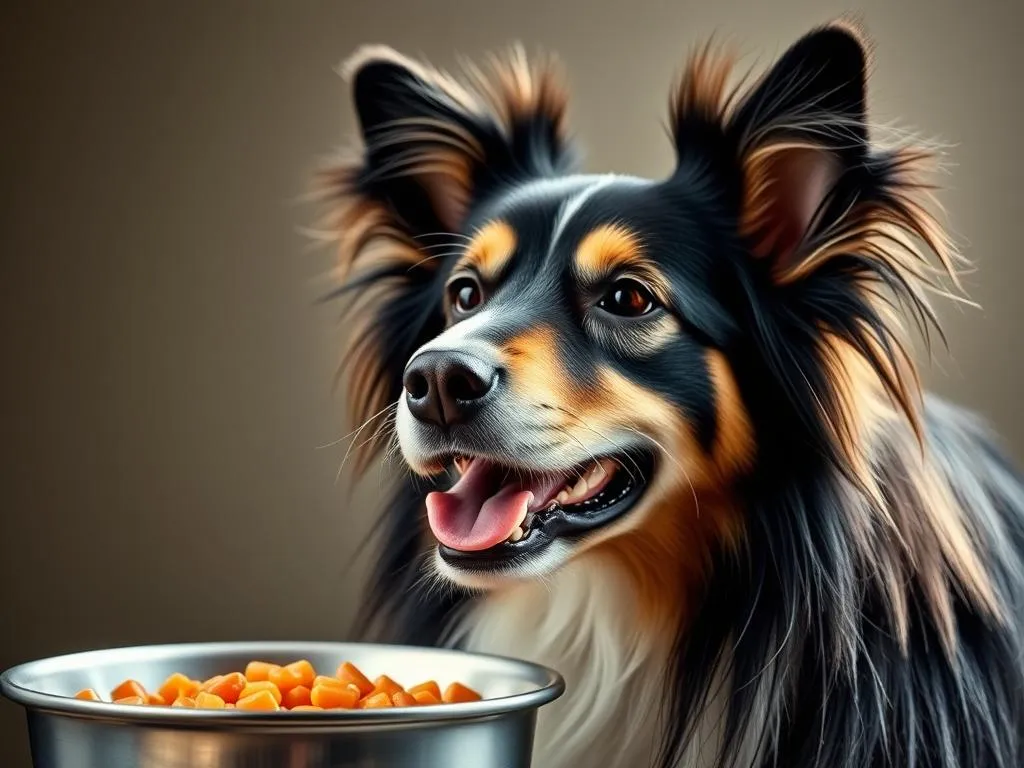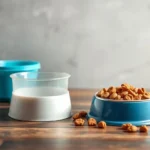
Introduction
Proper dog nutrition is crucial for the overall health and well-being of any canine companion. For Shetland Sheepdogs, commonly known as Shelties, their dietary needs are particularly important due to their unique characteristics and health predispositions. Understanding what constitutes the best dog foods for Shelties can help owners provide the right nutrients that promote long, healthy lives for these energetic dogs.
Understanding Shelties and Their Nutritional Needs
Breed Characteristics
The Shetland Sheepdog, or Sheltie, is a small to medium-sized breed known for its intelligence, agility, and affectionate nature. Typically, Shelties weigh between 20-40 pounds and stand around 13-16 inches tall at the shoulder. Their high energy levels require a diet that supports their active lifestyles. With an average lifespan of 12-14 years, it is essential to feed them a balanced diet that meets their nutritional needs throughout their life stages.
Common Health Issues
Shelties are genetically predisposed to certain health issues, such as hip dysplasia, eye conditions like Collie Eye Anomaly, and skin allergies. A well-rounded diet plays a significant role in managing these conditions, as the right nutrients can help mitigate risks and promote overall health. Owners should consider the impact of diet on these common health challenges, ensuring they choose high-quality dog foods tailored for Shelties.
Key Nutrients for Shelties
Protein
High-quality protein is fundamental for muscle maintenance, energy, and overall vitality in Shelties. The recommended protein sources for Shelties include:
- Chicken
- Turkey
- Lamb
- Fish
- Eggs
Look for dog foods that list a high-quality protein source as the first ingredient, ensuring your Sheltie gets the nutrition they need.
Fats
Healthy fats are vital for energy production and maintaining a shiny coat. Essential fatty acids, particularly omega-3 and omega-6, contribute to skin health and can help reduce inflammation. Sources of healthy fats include:
- Fish oil
- Flaxseed oil
- Chicken fat
A diet rich in these fats can greatly benefit Shelties, especially those prone to skin issues.
Carbohydrates
While dogs are primarily carnivores, carbohydrates can serve as a valuable energy source. However, it’s essential to choose the right types of carbohydrates. The best carbohydrate sources for Shelties include:
- Sweet potatoes
- Brown rice
- Oats
- Lentils
These ingredients not only provide energy but also contain fiber that aids digestion.
Vitamins and Minerals
A balanced diet for Shelties should include essential vitamins and minerals. Key nutrients include:
- Vitamin A for eye health
- B vitamins for energy metabolism
- Vitamin D for calcium absorption
- Calcium and phosphorus for strong bones
Consider supplements if the dog food lacks these essential nutrients, but consult your veterinarian before adding any new supplements to your Sheltie’s diet.
Types of Dog Foods
Dry Kibble
Dry kibble is a popular choice among dog owners due to its convenience and extended shelf life. Advantages of dry kibble include:
- Dental health benefits through chewing
- Easy portion control
- Variety of formulations tailored to specific needs
Recommended brands for Shelties include:
- Royal Canin Shetland Sheepdog Formula
- Hill’s Science Diet Adult Small Paws
However, some cons include potential low moisture content and the possibility of being less palatable for picky eaters.
Wet/Canned Food
Wet food is often more enticing for dogs due to its aroma and texture, making it a great option for Shelties. Benefits of wet food include:
- Increased hydration
- High palatability
- Easier for older dogs or those with dental issues to consume
Best wet food options for Shelties include:
- Blue Buffalo Homestyle Recipe
- Merrick Grain-Free Texas Beef & Sweet Potato
On the downside, wet food can be more expensive and has a shorter shelf life once opened.
Raw Diet
A raw diet, which includes raw meat, bones, and vegetables, has gained popularity among dog owners. Benefits of raw feeding include:
- Higher protein intake
- Improved coat condition
- Better digestion
However, there are risks involved, such as potential for bacterial contamination and nutritional imbalances. If considering a raw diet for your Sheltie, consult with a veterinarian to ensure safe and balanced implementation.
Homemade Dog Food
Preparing homemade meals for Shelties can provide complete control over ingredients. Guidelines for preparing balanced homemade meals include:
- Use lean meats as a protein source
- Include healthy fats and carbohydrates
- Add fruits and vegetables for vitamins
Ingredient suggestions for Shelties might include:
- Ground turkey
- Sweet potatoes
- Carrots
- Green beans
There are various recipes available online, but always ensure the meals are nutritionally balanced.
Top 5 Best Dog Foods for Shelties
Brand 1: Royal Canin Shetland Sheepdog Formula
- Ingredients: Chicken meal, brown rice, corn, chicken fat, and vegetable fiber.
- Nutritional Breakdown: 25% protein, 15% fat.
- Pros: Tailored specifically for Shelties with a focus on skin and coat health.
- Cons: Contains grains, which some owners may prefer to avoid.
Brand 2: Hill’s Science Diet Adult Small Paws
- Ingredients: Chicken, whole grain wheat, corn gluten meal, and barley.
- Nutritional Breakdown: 24% protein, 16% fat.
- Pros: Formulated for small breeds with high-quality ingredients.
- Cons: Higher price point compared to other brands.
Brand 3: Blue Buffalo Life Protection Formula Small Breed
- Ingredients: Deboned chicken, brown rice, barley, and oats.
- Nutritional Breakdown: 24% protein, 14% fat.
- Pros: No artificial preservatives, colors, or flavors; includes LifeSource Bits for added nutrition.
- Cons: Some Shelties may prefer a different texture.
Brand 4: Merrick Grain-Free Texas Beef & Sweet Potato Recipe
- Ingredients: Deboned beef, sweet potatoes, peas, and potatoes.
- Nutritional Breakdown: 38% protein, 17% fat.
- Pros: Grain-free and rich in protein; supports healthy digestion.
- Cons: Can be more expensive than grain-inclusive options.
Brand 5: Nutro Ultra Grain-Free Small Breed Recipe
- Ingredients: Chicken, lamb, salmon, and chickpeas.
- Nutritional Breakdown: 30% protein, 16% fat.
- Pros: High protein content and a blend of three proteins; rich in omega fatty acids.
- Cons: Some dogs may have sensitivities to fish ingredients.
Feeding Guidelines for Shelties
Portion Sizes
Determining the right serving size for your Sheltie is crucial to maintaining a healthy weight. Generally, the recommended daily intake for adult Shelties is between 1 to 2 cups of high-quality dog food, split into two meals. Always refer to the feeding guidelines on the dog food packaging and adjust based on your dog’s activity level and weight.
Feeding Frequency
Feeding frequency can vary based on age and activity level. For puppies, three to four meals a day are ideal, while adult Shelties typically thrive on two meals a day. Older Shelties may benefit from smaller, more frequent meals to support digestion.
Transitioning to New Foods
When transitioning to a new dog food, do so gradually over 7-10 days. Start by mixing a small amount of the new food with the old food, gradually increasing the new food while decreasing the old. Watch for signs of food intolerance or allergies, such as vomiting, diarrhea, or skin irritations.
Monitoring Your Sheltie’s Health
Weight Management
Maintaining a healthy weight is essential for Shelties, given their predisposition to joint issues. Regularly weigh your dog and adjust portion sizes as necessary. Use a measuring cup to ensure accurate serving sizes and avoid free-feeding, which can lead to overeating.
Signs of Poor Nutrition
Common signs that indicate nutritional deficiencies or issues include:
- Dull coat
- Weight loss or gain
- Lethargy
- Digestive problems
If you notice any of these signs, consult your veterinarian to evaluate your Sheltie’s diet and health.
Regular Vet Check-ups
Regular veterinary visits are vital for monitoring your Sheltie’s health, particularly as they age. Discuss your dog’s diet and any changes in behavior or health with your vet. They can provide personalized recommendations to ensure your Sheltie receives optimal nutrition.
Conclusion
Proper nutrition is paramount for the health and happiness of Shelties. By choosing high-quality foods, understanding their unique dietary requirements, and monitoring their health, you can significantly enhance your Sheltie’s quality of life. Remember, the right diet not only supports their physical well-being but also contributes to their overall happiness and longevity. Investing time in understanding the best dog foods for Shelties is an investment in their future.









